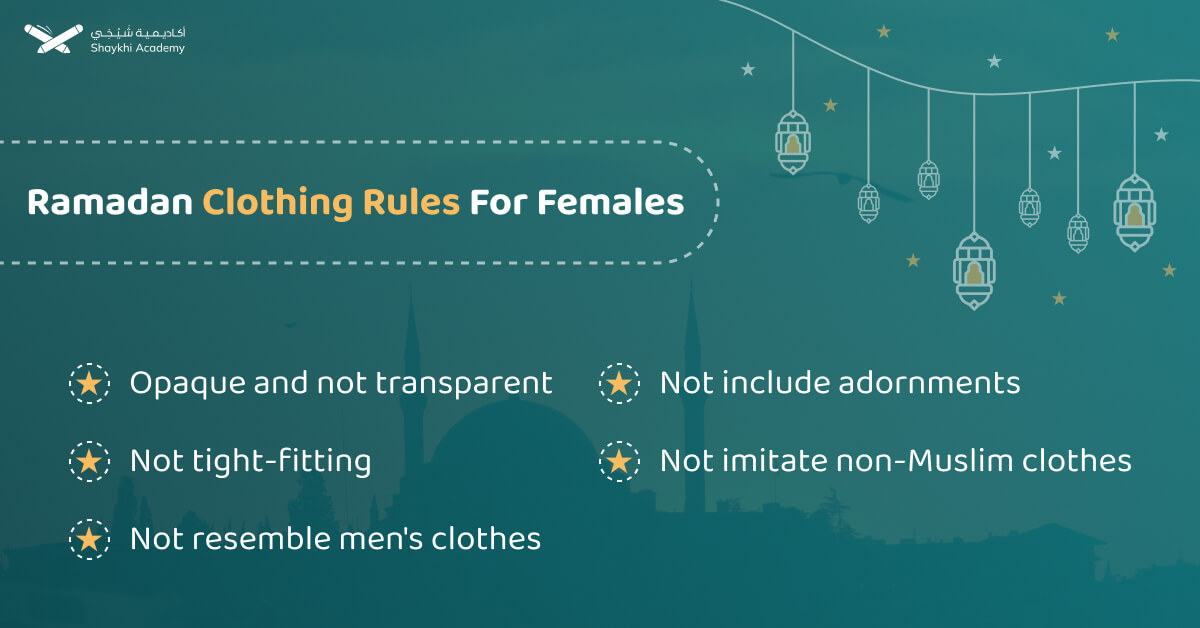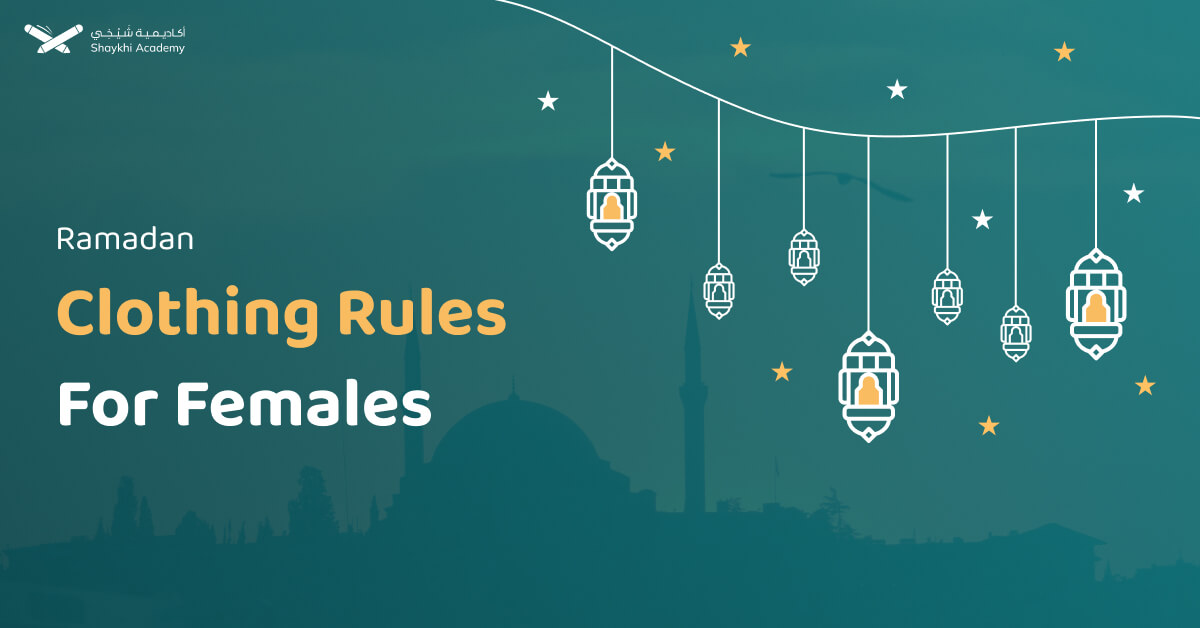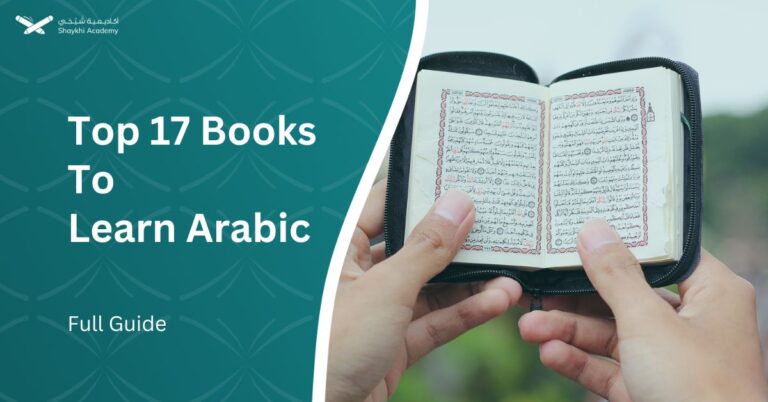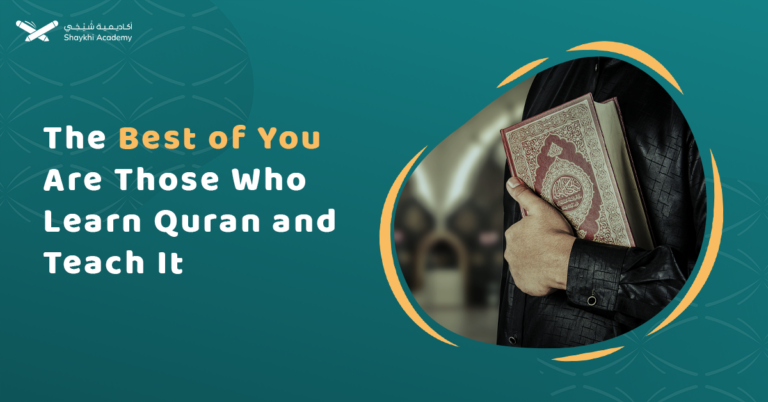Ramadan Clothing Rules for Females emphasize the importance of modesty and adherence to Islamic principles in dressing. The criteria include covering the entire body except for the face and hands, avoiding transparent or tight-fitting clothing, and refraining from imitating non-Muslims.
Wearing the hijab is obligatory at all times, with neglecting it considered a serious offense. Spouses may engage in permissible activities during fasting but must avoid anything leading to sexual arousal.
During Ramadan, women should engage in various spiritual, social, and charitable activities to maximize blessings. This includes fasting, prayer, recitation of the Quran, charity, engagement in good deeds, seeking knowledge, family bonding, self-reflection, and supplication.
Ramadan Clothing Rules
Muslim women must adhere to specific criteria when choosing their clothing during Ramadan, ensuring modesty and adherence to Islamic principles. Additionally, wearing the hijab is obligatory at all times, and neglecting it, especially during Ramadan, constitutes a severe offense requiring sincere repentance and commitment to wearing it properly.
Spouses may engage in permissible activities during fasting, provided they avoid anything that may lead to sexual arousal and fulfill their religious obligations if they knowingly and willingly break their fast.
Ramadan Clothing Rules For Females:
The Ramadan clothing of a Muslim woman must cover her entire body except for the face and hands, and it should not reveal her body to non-Mahram men except for what is permitted by Islamic law, such as her face, hands, and feet.
Conditions must be in Ramadan Clothing Rules For Females:
- The clothing should be opaque and not transparent, ensuring that the color of her skin cannot be seen through it.
- It should not be tight-fitting, as tight clothing outlines the shape of her body parts.
- Women should not resemble men in their clothing.
- The clothing should not include adornments that attract attention when she leaves the house, to avoid being among those who display themselves excessively.
- It is prohibited for Muslim women to imitate non-Muslims in their clothing, behavior, and customs, as it undermines Islamic identity and values.
Hijab In Ramadan:
Woman who wears the hijab only during Ramadan, it is essential to understand that wearing the hijab is obligatory for Muslim women at all times, not just during Ramadan. Neglecting to wear the hijab is a grave sin, particularly during Ramadan.
Ibn Taymiyyah stated that the punishment and reward are multiplied for those who neglect the hijab in the sacred precincts of the Haram and during Ramadan. Therefore, if a woman wears the hijab during Ramadan but intends to remove it afterward, she compromises her repentance’s validity.
To repent sincerely, she must cease her previous behavior, commit to wearing the hijab, repent for her past negligence, and resolve not to repeat it. This sincere repentance increases the likelihood of Allah accepting her repentance, as He is the one who accepts repentance from His servants and pardons their sins (Quran 42:25).
Ramadan Women’s Clothing For Her Husband:
As for the correct treatment between spouses during fasting in Ramadan, it is permissible for them to engage in any activity that does not arouse sexual desire, such as kissing and hugging.
They may wear any permissible clothing, but they should avoid clothing that may lead to sexual arousal. Suppose a man engages in sexual intercourse with his wife knowingly and willingly during Ramadan. In that case, he must make up for the missed fasting days, provide expiation (kaffarah), and free a slave if possible.
If unable to do so, he must fast for two consecutive months or feed sixty needy people. The woman is also obligated to make up for the missed fasting day if she knowingly and willingly participates in sexual intercourse during Ramadan. There is a difference of opinion among scholars regarding the obligation of expiation for her, and she should refer to specific fatwas for clarification.

What Should A Woman Do During Ramadan?
During Ramadan, Muslim women should engage in various spiritual, social, and charitable activities to maximize the blessings of the holy month. Here are some recommended practices for women during Ramadan:
1. Fasting:
Observing fasting (Sawm) from dawn until sunset is one of the central acts of worship during Ramadan. Muslim women who are physically able and not menstruating or experiencing postnatal bleeding should fast. However, those who are unable to fast due to menstruation, pregnancy, breastfeeding, illness, or other valid reasons should compensate by either fasting later or feeding a needy person for each missed day.
2. Prayer (Salah):
Women should offer the obligatory prayers and strive to increase their voluntary prayers, especially Taraweeh prayers performed in congregation at the mosque or at home. They should also engage in Dhikr (remembrance of Allah) and supplications (Dua) throughout the day and night.
3. Recitation of the Quran:
Women should dedicate time for reciting and reflecting upon the Quran, striving to complete its recitation at least once during Ramadan. They can also attend Quranic study circles or listen to Tafsir (exegesis) to deepen their understanding of the Quranic teachings.
4. Charity (Zakat and Sadaqah):
Women should engage in acts of charity by giving Zakat (obligatory almsgiving) if they meet the criteria, as well as voluntary Sadaqah (charitable donations) to support the less fortunate. They can contribute to feeding the hungry, providing healthcare, sponsoring orphans, and other charitable initiatives.
5. Engagement in Good Deeds:
Ramadan is an opportune time for women to engage in various acts of kindness and goodness, such as visiting the sick, helping neighbors, reconciling between people, and supporting community initiatives.
6. Seeking Knowledge:
Women should seek opportunities to increase their Islamic knowledge by attending religious lectures, seminars, and classes, or participating in online courses and webinars. They can also study the Seerah (biography) of the Prophet Muhammad (peace be upon him) and Islamic history to gain a deeper understanding of their faith.
7. Family and Community Bonding:
Women should strengthen family ties by spending quality time with their spouses, children, parents, and relatives, fostering a sense of unity and compassion within the family. They can also participate in community iftars (breaking of the fast) and other Ramadan-related activities to foster a sense of solidarity and brotherhood/sisterhood among Muslims.
8. Self-Reflection and Repentance:
Ramadan is a time for introspection and spiritual growth. Women should engage in self-reflection, evaluate their actions and behaviors, seek forgiveness for past sins, and make sincere repentance. They should strive to rectify their relationships with Allah and seek His mercy and forgiveness.
9. Dua and Supplication:
Women should increase their supplications (Dua) during Ramadan, especially during the last ten nights, when Laylat al-Qadr (the Night of Decree) is believed to occur. They should pray for guidance, forgiveness, and blessings for themselves, their families, and the entire Ummah (Muslim community).
10. Unlock the Path to Quranic Mastery with Shaykhi Academy!
Are you seeking the finest Quranic education right from the comfort of your home? Look no further! Shaykhi Academy stands out as a premier online Quran learning platform, dedicated to providing exemplary education to both children and adults.
Why Choose Shaykhi Academy?
- Connect with highly qualified native tutors.
- Flexible scheduling to suit your busy lifestyle.
- Affordable classes tailored for all levels.
- Accessible from anywhere around the globe.
Discover Our Range of Courses:
- Arabic Noorani Qaida: Lay a solid foundation for Quranic studies.
- Online Quran Classes for Kids: Engaging lessons for lifelong learning.
- Tajweed Rules for Kids: Learn to recite with confidence.
- Quran Hifz for Kids: Step-by-step guidance to memorize the Quran.
- Quran for Adults: Introduce yourself to Quran reading and Tajweed rules.
- Online Arabic Courses: Master the language of the Quran.
- Islamic Studies: A wide range of topics related to Islam, including theology, law, Quranic studies, Hadith.
Don’t Miss Out on Your Chance to Excel!
Whether you’re a beginner or seeking advanced knowledge, Shaykhi Academy can guide you! Book your free trial now and make Ramadan 2024 your Quranic turning point!
Conclusion:
Ramadan presents a unique opportunity for women to enhance their spirituality and engage in acts of worship and righteousness. By adhering to the Ramadan clothing rules, women demonstrate their commitment to modesty and Islamic values.
Through fasting, prayer, charity, and self-improvement, women can deepen their connection with Allah and contribute positively to their families and communities. Shaykhi Academy offers a convenient platform for women to pursue Quranic education and excel in their religious journey during Ramadan and beyond.

































